SimonSkafar
The ARK Innovation ETF (NYSEARCA:ARKK) has been around since 2014. I wasn’t aware of the fund’s existence until Cathie Wood, CEO and CIO of Ark Invest, started appearing on CNBC to tout her fund’s results.
As As you can see below, ARKK’s results were great in the early 2020s, but have lagged significantly in recent years due to the ETF’s price decline:
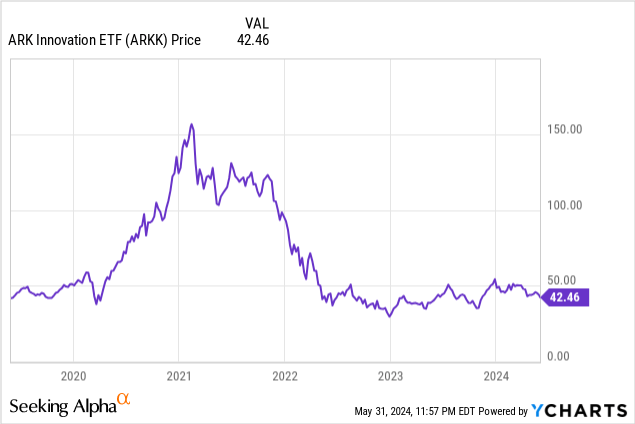
I’m not as negative on Woods and ARKK as many other analysts, but I think investors would be better off allocating their funds elsewhere. Let’s look at the details of the ETF and I’ll explain why I’m not optimistic about this particular investment.
Risk does not equal reward
As many know, the ARK Innovation ETF focuses on investing in “disruptive innovation.” In the fund descriptionhe then specifies that the fund invests in products or services that could change the way the world works. I’ll get into the specific areas the fund likes to invest in later, but I think investors can infer from this description that these types of investments are high risk. The public companies that ARKK invests in have the “potential” to change the world, but also have a higher probability of failure.
A simplified investment approach is that if you allocate funds to a riskier asset, you expect a higher reward.
If you can compare ARRK’s performance to what I would describe as less risky ETFs such as the Vanguard S&P 500 ETF (VOO) and Invesco QQQ Trust (QQQ), you will see that ARKK does not provide superior returns:
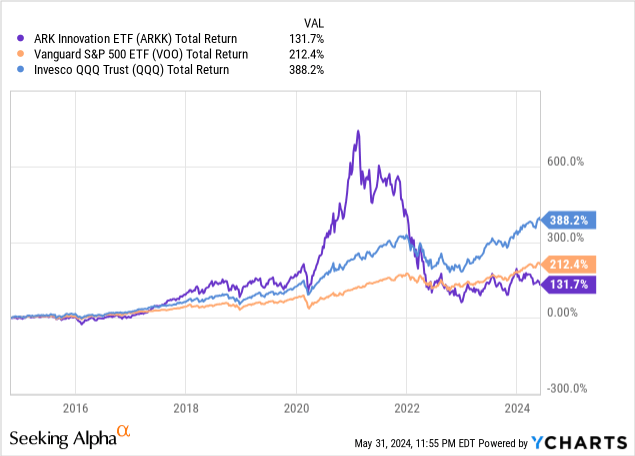
Additionally, if you look at Seeking Alpha’s risk rating and related metrics, you can see that Wood’s ETF received an “F” rating:
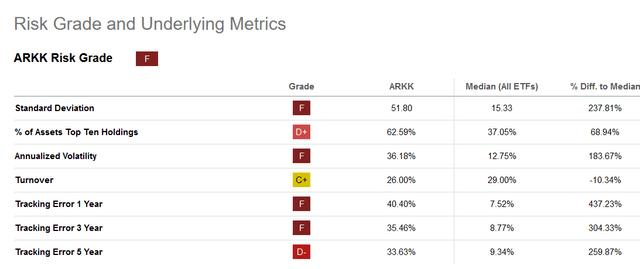
In search of Alpha
One of these metrics, which I would specifically like to discuss in more depth, is revenue. Currently, ARKK’s turnover percentage is 26%, which is close to the median of all ETFs. If you compare ARKK to the other two ETFs I listed above, ARK is superior to QQQ which has a turnover percentage of around 22% and much higher than VOO which has a turnover percentage of 2%.
As a long-term investor, I prefer to have an ETF with lower turnover. Legendary investor Terry Smith of Fundsmith said in his book “Investing for Growth” that one of his ten golden rules of investing is to trade as little as possible. Although Smith’s writings predate Robinhood (HOOD) and the emergence of no-fee trading, but I still think Smith’s rule holds water (Smith still follows this rule from what I found because his fund has a turnover percentage of 10%). In my opinion, lower turnover is linked to greater conviction in a company and better due diligence. I understand that unforeseen issues may arise that change the narrative of an investment thesis, such as changes in management, macroeconomic conditions, or new competition in a market. However, it appears that Wood and his team are taking some strange actions that make you question the fund’s decision-making.
For example, Wood added Nvidia (NVDA) to his fund a few years ago, which I would definitely say is a company creating “disruptive innovation”. However, due to her lack of conviction, she sold early and missed huge potential profits.
To provide another example of questionable logic, Wood bought significant shares in one of its main titles, Uipath (PATH) the day before the publication of the results for the first quarter of 2025. The stock fell the next day following the resignation of the company’s CEO. Obviously, Wood probably wasn’t aware of the resignation, but now seems questionable timing to buy stock.
As noted on the ARK Invest report website, the goal is to have 15% annual turnover, but Wood and his team have clearly made more changes to the fund. This calls into question the fund’s analysis and screening process coupled with fund decision-making. I’ve only shared two examples of Wood’s recent activity, but with a simple Google search or Seeking Alpha, investors can find many more examples of head-scratching decisions.
Fund structure
As mentioned above, the fund focuses on disruptive innovation and focuses on several key areas. These areas include genomics and DNA technologies, fintech, robotics, automation and artificial intelligence.
As of May 29, the fund’s top ten holdings were:
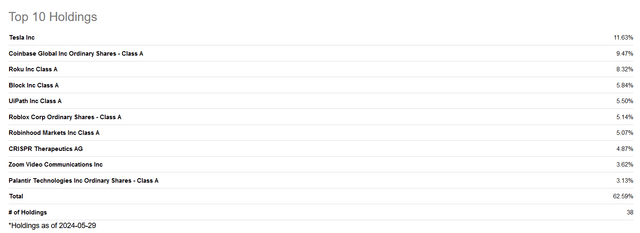
In search of Alpha
ARKK currently has 38 holdings and as you can see in the chart below, the holdings are fairly evenly distributed across five sectors:

In search of Alpha
I think it is very likely that among these 38 stocks, one or more will be big winners. However, my problem is that I’m not sure Wood and his team have the patience or conviction to hold this winner, given the fund’s turnover percentage and recent performance. Rather than investing in ARKK, this is what I would do as an investor.
Shotgun approach
Like another analyst said, Wood takes a “shotgun” approach, trying to hit as many of these disruptive areas as possible. I agree that this is what ARKK is trying to accomplish, but it hasn’t worked in recent years.
If investors want a similar approach, there are two particular ETFs that I believe are better suited for investors than ARKK, the Vanguard S&P 500 ETF (VOO) and Invesco QQQ Trust (QQQ).
QQQ is a great alternative for more risk-seeking investors, but as you can see from the risk metrics on Seeking Alpha, it is a slightly safer investment with a “C+” rating:
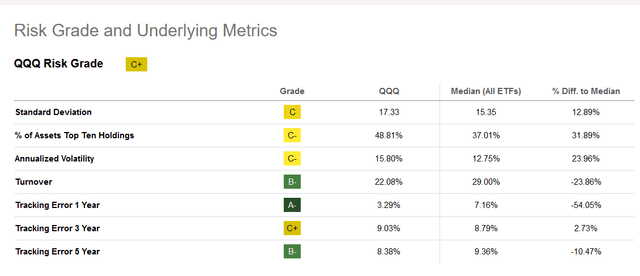
In search of Alpha
I believe QQQ can offer investors the opportunity to invest in many of the disruptive investment thematic categories that ARKK also offers, such as artificial intelligence, robotics, fintech and automation.
Below are QQQ’s top ten stocks as of May 30:
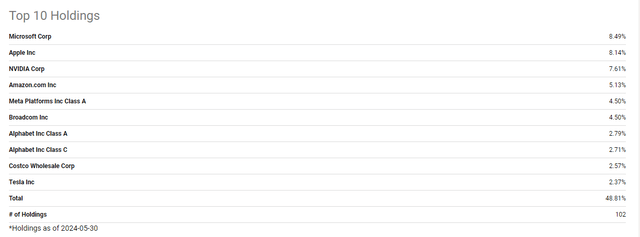
In search of Alpha
Although these are large caps, I still believe that many of these companies like Nvidia (NVDA) and Microsoft (MSFT) will be leaders in categories such as AI.
One of the downsides of QQQ is that it is very technological, as you can see below:

In search of Alpha
My favorite ETF to invest in is VOO. As you can see from Seeking Alpha’s risk metrics, it is a much safer alternative than QQQ and especially compared to ARKK:
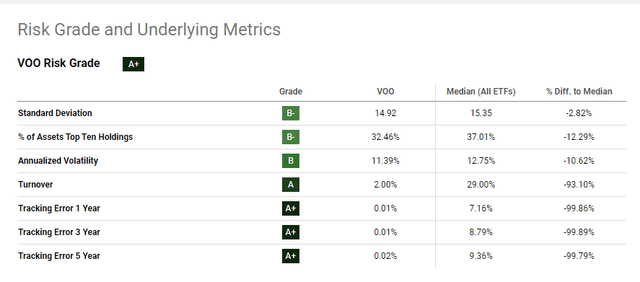
In search of Alpha
Additionally, although VOO is still about 30% technology, it is much more diverse than QQQ:

In search of Alpha
When it comes to my investing style, I like to invest most of my capital in more risk-averse investments, which makes VOO a great choice. As the metrics above indicate, this is a less risky ETF than ARKK, but this ETF has returned more to investors. Also, compared to QQQ, I like the fact that VOO is less tech heavy.
Bitcoin and specific thematic investment ETFs
Wood is a Bitcoin Bull and so I think some of his investments are proxy Bitcoin plays, Coinbase is the obvious proxy and to some extent Block (S.Q.) and Robinhood (HOOD) are also. Rather than buying the proxies, I would simply buy Bitcoin itself if you believe in this asset. I have a small portion of my individual capital allocated to Bitcoin.
I think some categories are more difficult to invest in. Personally, I think genomics and DNA technology is a particularly difficult investment theme given that it’s difficult to know which company will succeed in its early stages. I think the Ark Genomic Revolution ETF (ARKG) is as good as any ETF when it comes to investing in this specific area.
Additionally, Ark Invest offers several other more specific thematic ETFs such as ARK Autonomous Technology and Robotics (ARKQ) and ARK Fintech Innovation ETF (ARKF). This can provide good opportunities for investors looking to invest in a specific area. However, I’m more inclined to buy VOO or QQQ instead of one of these specifically thematic ETFs.
Conclusion
ARKK ETF is aimed at high-risk, high-reward investors, and lately the rewards haven’t been there.
I think Wood and the Ark team seem to lack conviction and have difficulty identifying “disruptors” worthy of sticking around for a significant period of time.
I think there are better funds than ARKK, like QQQ for investors willing to take more risk or VOO for those looking for less risk and more diversification.
Investors need to determine their risk tolerance and find one or more particular investments that allow them to sleep soundly at night.
For my part, I plan to stick to a safe bet in VOO, invest in a few high-quality founder-led companies, and allocate a small percentage of capital to Bitcoin.


